
Here we go again. Last week, I finished my second “block” of med school. It was a pretty short block and lasted for only 6 weeks. Throw in a few public holidays here and there, and bam, by the time it started, it felt as if it had already finished. Whilst block one was called foundations, this block was called our musculoskeletal block – where we learnt all about things that could go wrong with our bones, muscles, joints, ligaments, tendons, all that kind of stuff. It felt as if we were starting to learn medicine for real!
If block one was getting used to things being completely new, block two was getting used to the fact that things were starting to be gotten used to – and that, too, required getting used to. Though it was a short block, there was no shortage of things racing through my mind – especially in the cold small hours of those wakeful nights where you can’t get to sleep. So, here are my reflections from block two. I’ll begin by talking a little bit about musculoskeletal and the things I’ve been thinking about and doing, and towards the end, I’ll share some of the deeper emotional and relational ups and downs as well.
(1) Muscles and Bones

Lining up for our anatomy spot test exam
Let’s think about things which kill you. Do you know what the top three causes of death worldwide are? In first place, we have ischaemic heart disease – this is the stuff that causes heart attack. Second place belongs to stroke – which I like to think of as the brain version of a heart attack, a “brain attack”, if you will. And our bronze medal winner in third place is lung disease – the biggest killer here is called COPD, think… breathing difficulty, emphysema, smoking, bad stuff.
So, the big three killers are heart attack, brain attack, and lung attack – if I could put it this way. As we make our way down the list, we see other big killers, such as diabetes (sugar attack), dementia (thinking attack), diarrhoea diseases (tummy attack), tuberculosis (bacterial attack), and even road injuries (unsafe drivers attack). Stay safe on the roads, kids.
Wait, hold on.
Do you notice how none of these major killers are things that involve your muscle and your bones? They involve your heart, or brain, or lungs, or other parts of your body… but not the muscle and not the bones. Simply put, musculoskeletal disease doesn’t really kill you. And here we were, spending a whole block learning about musculoskeletal disease. Surely, if we wanted to save lives, and save as many lives as possible, then we should really be investing our attention in other things, right?
Yes, in one sense, I do think that statement is very true. But you know there’s a caveat coming, don’t you? Musculoskeletal disease may not kill you like heart, brain or lung disease, and it is so ordinary. Yet, in a very ordinary fashion, it can certainly destroy your life in plenty of other ways, and it’s an express ticket to make your life suck. Musculoskeletal disease is ordinary, and it is disabling.
Let me paint a picture for you. Countless people across the world suffer from lower back pain (this might be you). It doesn’t kill you, yes, but damn it hurts. In some cases, it stops you from going to work or doing the things you love, and on some days, it stops you from doing anything at all. Or, even if you can still do everything, you go through your days with a constant, low-grade pain. Thinking about some other areas of musculoskeletal disease, I’ve heard stories of people with rheumatoid arthritis, who at their worst points, can’t even dress themselves or open doors because their joints are so stiff and painful. I hear disturbing statistics about the number of elderly people who fall, break their hip, and as a result, lose their independence and spend the rest of their days requiring high level care in a nursing home. Or even in my own life, I have an alarming number of friends who injure their ACL playing oztag and need to spend several months going to uni in crutches – and though they are alive and well, their level of independence, convenience, and thus quality of life, take a big hit. It really does suck.
Musculoskeletal disease may not kill you, but it can sure stop you from living well.
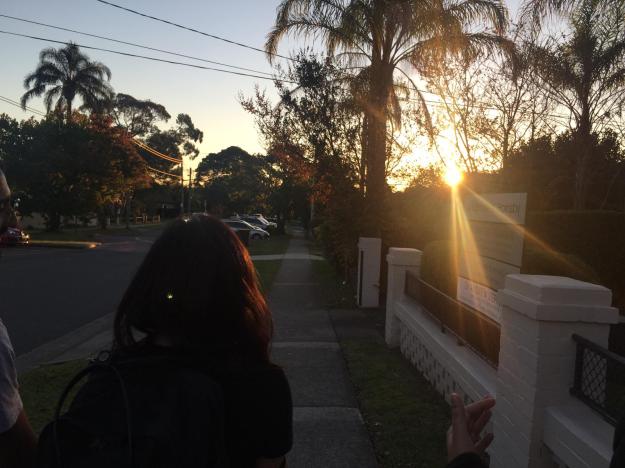
The miracle of walking home after a long day of hospital
I’ve come to understand a little bit more about the concept of disability this block: when something stops you from doing the things you need to do, or the things you love to do. It seems there is more to being alive, than, well… being alive. It’s not enough to have a beating heart and a working brain – that actually, we need to get out there, move about in this world, and do things. And I’ve really come to appreciate that one of the things that make this possible is the most wondrous structural and contractile apparatus that we all own, known as our musculoskeletal system.
In the past, I’ve always thought very little of bones and muscles. They were boring. Anatomy sucks. It’s hard. And no one cares. (Lol). But I think my eyes have really been opened to its wonders. See, I could have the brain of a human, but if I had the body of a plant – life would be unimaginably different. Instead, I am in control of this biological machine that lets me move around, and walk, and play the piano, and write, and run, and do wing chun kung fu – you name it. Even take walking, for example. It is such a mindless, simple, basic task for all of us. Yet, if you think about the events that take place when you walk – muscles contracting at just the right time to bring your leg up, whilst other muscles contract in the opposite direction with just the right tension to maintain stability, whilst still other muscles are projecting your centre of mass forwards. It’s insane, and we don’t even think about it. Our musculoskeletal system is marvellous – yet, when it goes wrong, it really does suck.
That, I have learnt, is the wonders and the terrors of the musculoskeletal system.
(2) The Well-Differentiated Adenocarcinoma
This block, I’ve been thinking hard about the question of “how do I not let medicine take over my life?” It’s a hard one. Because no matter how hard I try, no matter how much I try to be cool and chill and not too keen, somehow medicine always finds a way to swallow me, in one way or another.

deccas! bumming outside manning between labs
In the second week of the block, on the Saturday, I popped into a conference run by the CMDFA – that is, the Christian Medical and Dental Fellowship of Australia. The main speaker here was a guy named Jeremy Beckett, who is a Christian and Australian doctor living and working in East Timor. He gave a real spicy talk exploring the balance and tension between our “work” (either as a medical student or a doctor), and the way we relate to God and everything else in our life, which he termed our “worship”. In this talk, he presented a really interesting image which has stuck with me since – he described medicine as an adenoma. An adenoma is a tumour that can grow in various places in your body, like your colon. Whilst most adenomas spend their whole careers as a pretty chilled-out tumour, they do have the capacity, given time, to transform into something much more dangerous, become cancerous, and spread all over your body (we call this an adenocarcinoma). Medicine, like that benign adenoma, has the capacity to become a well-differentiated adenocarcinoma that takes over the whole of our lives.
So, it might start out like this, keen but not too keen, everything nicely balanced:

But then slowly, it might look a bit more like this:
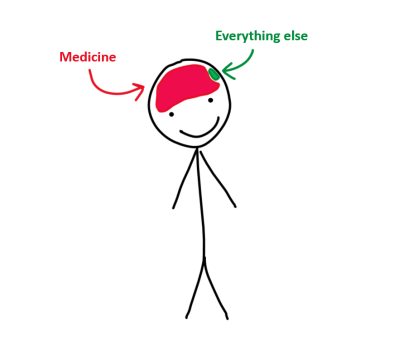
And then well, if the tumour becomes malignant and you let it spread, well… sometime it do be like dis:

What does the insidious red blob actually represent, though? One way to interpret it is to say it represents how you spend your time. So, you spend a reasonable number of hours doing medicine (going to class, studying, revising, etc.) and as it progresses, you find yourself spending more and more time doing medicine. A second way to interpret would be to say that it is the amount of energy and headspace I devote to medicine – so, as the tumour progresses, I find myself thinking and concerning myself more and more with medicine. A third interpretation, which is the one that Jeremy Beckett goes for, is that the blob represents how you place your identity. Initially, I would answer the question “who am I?” with a whole variety of things – this is my family, these are my friends, these are the things I like to do, these are the things I believe and am passionate about, oh and also (last, but not least, but also not most), I’m studying medicine at university. But as the tumour progresses, medicine becomes a bigger and bigger part of my identity, until I make the fact that I study or practice medicine the most important thing about myself.
I can definitely feel all three of these things happening, and it’s a constant tug-a-war.
Some weeks, I wake up in the middle of the night, it’s 3 am, my mind is completely buzzing, and I find myself recalling the proximal attachments of the tibia, or thinking about the drug oxycodone and its mechanism of action, or considering the risk factors for osteoporosis. Like what the heck, brain pls stop thinking. It’s bewildering. Please let me have my half-awake, barely-conscious foggy daze without the need to lie in bed subconsciously revising for my next exam. Or, I think back to all the conversations I have with my friends, what do we talk about? Well, seeing as most people I see during the week are med students, I find that my conversations always go back to medicine. We talk about the lecture. Or the upcoming exam. Or what we saw on our clinical day. Or anti-vaxxers (haha). So not only am I constantly thinking about what I’m learning, but I’m also constantly talking about what I’m learning. Honestly, I think it’s natural, and also really great, that we chat about the things we are learning about. And since we spend our days being overloaded with information (that is, unfortunately, the nature of med school), I think it’s also natural that these things linger in our minds.
But at times, I really wonder – has medicine taken over my life?
Do you feel the tension here? Medicine honestly is a really great thing, and probably a great cause to devote time to. But at the same time, you do feel that that it has its own place and shouldn’t take over my (or your) life, right? I think medicine promises a lot – and there is so much potential to do good with it, to save lives, to care for others. But let’s say I chase relentlessly after it and make it the whole of my life – if I throw my life completely into the consuming fire of medicine, what will be the outcome? I suspect I will be left only with exhaustion and disillusionment. Worse still, I can take many of the precious things in my life – my family, my friends – and end up sacrificing them on the altar of medical altruism. In the name of “doing good” through medicine, and letting it take over my life, I neglect many other important and good things. Medical altruism is a genuinely great cause, but if it ends up so important that I give up all else, is it still great?
I might conclude in the way that Jeremy Beckett concluded his talk: a career in medicine brings wonderful opportunity to do good – it certainly will be fulfilling, but it won’t be, and can’t be, our fulfilment. It is one good, and not my only and ultimate good. It will not be the thing that makes me whole. And my challenge is to continue to work out what living out this reality looks like, both as a student now and perhaps in due time as a practitioner.
(3) Teddy Bears
So, one day, a few of us went along to the Easter show and pretended to be doctors! Not a doctor for humans though, but for teddy bears.

Frederico the bear, a regular at the clinic
This was at the Teddy Bears Clinic, run by the Westmead Children’s Hospital. The idea was that kids could bring along their teddies and have them checked up – and in doing so, we could help the kids get used to what the hospital is like and make them feel more comfortable about going to hospital themselves. It was actually really cool. There was even a teddy-sized MRI machine, where the kids could listen via headphones the noise that a real MRI machine makes. I had never seen anything like this – using play and simulation to prepare kids for the hospital and for medical procedures (and actually, there’s a particular allied health job which does exactly this, called ‘Child Life Therapy’).
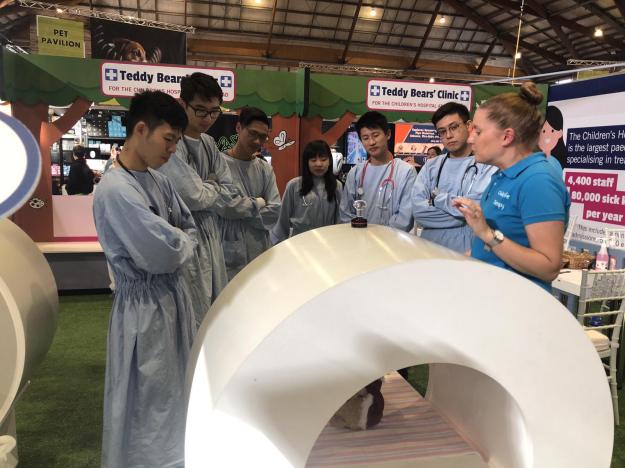
Teddy-sized MRI
As medical students, we are pretty unqualified to treat humans. But damn, we are so qualified to treat teddies. The treatment algorithm is actually very simple. If it is a minor injury, you slap on a band-aid or a bandage. But if it is something a little bit more moderate to severe, then you may need to whip out the big guns. The sensible option at this point is to prescribe hugs for your teddy (three times per day, for two weeks) – and it’s really important to inform your patient that they need to finish their course of hugs, because comorbidities arising from teddy neglect is an emerging epidemic, and soon to be overshadowing the antibiotic resistance crisis, if I dare say so. Only order an MRI if you suspect teddy has suffered a stroke (unlikely).
The kids were super adorable. Some of them started out super shy, and still some remained super shy through the whole ordeal. But seeing their faces light up, especially when we needed to give teddy a hug, was a very special thing.
Checking up teddies wasn’t the only clinical experience we had this block though – we did get to see humans too. Generally, human disease is a bit more serious than teddy disease, unfortunately. But it felt as if things suddenly got really real. In our clinical days at the hospital, we learnt what questions to ask in order to screen for “red flags” when someone came in with back pain (including making sure it wasn’t cancer). We learnt how to tell the difference between rheumatoid arthritis and osteoarthritis in a patient. We learnt how to examine the knee joint and make sure your ligaments (like your ACL) are intact. Suddenly, we were learning all these things that we would potentially use in the future – and whilst this was exciting, it was also pretty scary, not gonna lie. Whilst I did learn heaps this block, it only taught me that I had a lottttttt more to learn ^__^”
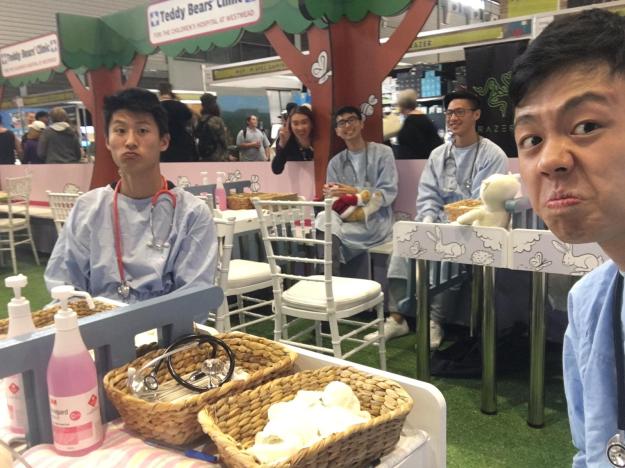
At the teddy bears clinic!
(4) Honey
Thanks for reading this far, by the way. This is the section where I talk about the deep things and moods and peoples and emotions and stuff like that.
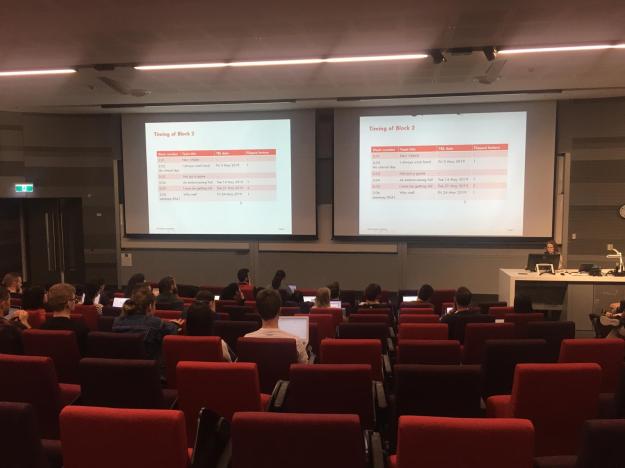
The opening lecture of block 2
Here I want to expand on what I said at the beginning, when I mentioned that block two was “getting used to the fact that things were starting to be gotten used to.” Block one was a season of getting used to things – spending my days in a new environment, doing new things, surrounded by new people. As such, it was filled with uncertainty, and a fair amount of loneliness and lostness as I figured things out. Block two was different. By now, I was starting to get used to things. I knew what to expect in terms of learning in the medical program. I had made some friends and was starting to get to know people better. And I had a better grasp of what the weekly rhythms looked like.
With all that in mind, block two started with a high! There were so many little, yet awesome, things that happened for which I was very grateful. I was able to catch up with people for coffee and have good chats. I was able to spend time studying with others as we started the block. I was also able to get to know lots of new people too. Lots of people time! But it was a nice change, and it was as if there was bright light cutting through the fog of isolation I had felt in the previous block. It seems like things were coming together and there was a hugely exciting block ahead. I remember heading back into uni on the Tuesday of our second week back, and honestly, I was just elated. I was feeling so happy and I was so grateful for all the things that were happening, big and small. A new block of learning, with new and blooming relationships and opportunities and things to enjoy. What more could I ask for? I was filled with energy, and I bounded into each day with great joy.
In fact, looking back on it, it perhaps seems that too many good things were happening…? Perhaps you might call me cynical, but I find it suspicious, perhaps even slightly dangerous, when things are going so well. Even in this high, there was an apprehensive sense of caution creeping up on me in the back of my mind. Surely, sooner or later, something was bound to shatter this, right? And yeah, that’s what happened.
Like running out of steam, there was a moment when I felt the high completely dissipate. I had reached the limit of my high-energy, lots-of-people-time, euphoric episode, and with all that energy leaving me, I felt the sudden drop. The lull. The low. This was accompanied by exhaustion, alongside a whole other range of things – feelings of uneasiness, insecurity, and restlessness. And in this exhaustion, suddenly all these good things that were happening suddenly became… overwhelming? My friend Jas describes this kind of phenomenon as being “peopled-out”. Suddenly, rather than finding myself reacting with joy when I was around people, I was filled with an unnerving anxiety. At one point, I recall asking myself “do I actually have the energy to sustain these relationships and always be cheerful? I just want to run away from everyone!” So, it seems like I was getting peopled out.
But as I look back onto it, there was a second force at work. Now that I was surrounded by all these exciting, budding relationships, I found myself in a deeply “people-pleasing” phase. I wanted to be a friend to everyone, to make everyone happy, to have everyone like me – there was so many people that I wanted to love (and indeed, wanted their love back). Perhaps this was a good thing – I did want relationship after struggling through a season of disillusionment, cynicism, and loneliness. I really, genuinely wanted to do life with after people. But it was a weight far too heavy to bear. I remember one dreadful moment of anxiety thinking about where to sit in a lecture. I walked in with a friend that I had met recently. But as I looked across the room, I saw some close friends of mine from undergrad. And still in other parts of the room were other friends which I was getting to know recently. And further still in another part of the room was my usual lecture buddy. And at this point, my heart was filled with the fear of the possibility that any one of them might think “Oh Otto is always just hanging out with those other people nowadays, no time for us anymore.” Here I was in a room filled with great people, old friends and new friends alike. Yet, the phenomenon of separation and the ensuing fear of picking one that I might lose the other – oh man, this stirred my restless heart like an eggbeater. Fear of commitment, fear of loss, FOMO, or whatever emotion it was, danced and danced in my heart.
It was a dreadful combination – being at the same time people-pleasing and peopled-out. I could not possibly be the friend or person I wanted to be to everyone, and the weight and responsibility of relationship became overwhelming. To my friends reading this, you may not know all the crazy things going on in my heart, but I just want to say – thank you for being my friend, for putting up with me, for sticking by me though I wrestle with these things.
The solution? Prescribe hugs (three times per day, for two weeks) – just kidding, I’m not a teddy bear, silly – and a five days holiday courtesy of ANZAC day public holiday. Over that very long weekend, I had the chance to rest and have some time for myself, and to recalibrate my perspectives. An immensely helpful voice in this time has been that of C.S. Lewis – yes, the guy who wrote Narnia, a childhood classic – and also this very strange proverb from the bible:
“If you have found honey, eat only enough for you, lest you have your fill of it and vomit it.” (Proverbs 25:16).
When I read this, I was actually cut to the heart, and felt as if it was like it was speaking to me personally. Let me explain a bit.
C.S. Lewis writes about a thing that happens in us human beings, which he calls the “lust of encore”. This is a terrible itch for overindulgence and a desire to have more than what is enough. It’s when we think it’s not enough to have just one scoop of ice cream (a good thing!) and decide to eat the whole tub. Or, when it’s not enough to watch a little bit of Netflix (again, a good thing!) and decide to binge the whole season into the late hours of the night. Rather than being content with something good in just the right amount, we opt for more and more and more, until it makes us sick. This is what the biblical proverb about honey is talking about – this dreadful lust of encore, the desire for “more!” and “again!” And this is exactly what I was doing. I was chasing relational highs. And each time I received a high – a positive interaction, a good conversation, a moment of connection – I wanted more, and more. I had too much honey, and now I wanted to vomit. I had too much people time and expended myself too much, and now I was sick of people and wanted to run. Here, my people-pleasing was the desire to overindulge in honey, and the consequence was that I would experience the nauseating sickness of being peopled-out.
A second, extremely helpful observation from C.S. Lewis (he is so good, like a physician for the soul) is a concept which he calls the “law of undulation” – that is, our lives inevitably go up and down. We have highs, we have lows. We need to be aware of this and be okay with it. Not me though. I decided to feast off the highs. I would live off these relational highs. And when the high wore off, I would slump back into depression… until the next high. I was like a ship blown about by the winds on the sea – my heart was restless, and I didn’t have anywhere to ground myself. Lewis writes:
“It is simply no good trying to keep any thrill: that is the very worst thing you can do. Let the thrill go — let it die away — go on through that period of death into the quieter interest and happiness that follow — and you will find you are living in a world of new thrills all the time. But if you decide to make thrills your regular diet and try to prolong them artificially, they will all get weaker and weaker, and fewer and fewer, and you will be a bored, disillusioned old man for the rest of your life.”
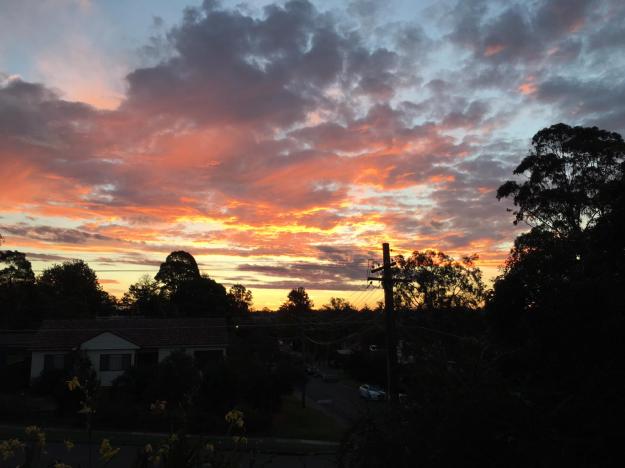
A glorious sunset in Hornsby, marking the end of the block
And so, I learnt my lesson.
Simply put, I needed to learn how to live ordinarily, and sustainably. I should continue to chase after good things, definitely. But I should be careful not to overindulge. If I am starting to get to know someone, I should not need to continue to desperately chase after it in a search for relational fulfilment. Rather, I could enjoy whatever conversation we just had, and be at peace, and be on my way, and then go do something else with my time. I need not cling onto relationships so tightly that any thought of being separated would create an immense fear of loss. Things are not mine to hold. See, things are made to be received and enjoyed (relationships included), but not held onto tightly. But in any moment, and in any season, the Lord can give, and the Lord can take away. And in order to properly enjoy these things, I need to learn to let go a bit.
(5) Fog

the roof of cafe ella
Near the end of the block, I was grabbing coffee with a friend in my clinical group.
She said, “I feel like I’ve been physically present, but mentally absent. There’s like a big fog in my mind.”
I stopped.
“Fog. That’s exactly it. That’s what it is.”
I feel like this block has been filled with fog. There has been a big haze over everything. Though I was starting to get used to things and thought things were generally okay – like seeing the patch of ground on which I stood – more often than not, I couldn’t see into the distance, and I had no idea where I really was.
Do you know that feeling when you just wake up from a dream, and though you’re in the real world now, you still feel the emotional inertia of that other dream-world? You care heaps about the things in the dream, until you actually “wake up” and realise “oh, that was just a dream.” It’s like when I wake up from my dream, and say “no, I must save my cat!” before I realise, “oh I don’t actually have a cat.” I call this phenomenon the dream fog, which is why I was so surprised when that word popped up in conversation. Because this sums it up really well. It’s a fog that obscures your vision and your thinking and your feeling, until it lifts, and you see things for how they really are.
For much of this block, my mind was anxious, working overtime, ruminating over this and that, dwelling over relationships and conversations and possibilities. It was working in much the same way my mind would work where I would wake up and my mind would be racing to figure out 99 solutions to save my cat, before I realised that I didn’t have a cat and calmed down. It felt that I was in this chronic dream fog, really anxious about something, and not being able to think straight – and what I needed was to wake up.
It hasn’t been all fog though. I’ve learnt lots of things, both medically and personally. And it is my hope and prayer that I might continue to walk forwards, wide awake, with both clarity and stillness.
Thanks again for reading and walking alongside me in this journey. Until next time then.